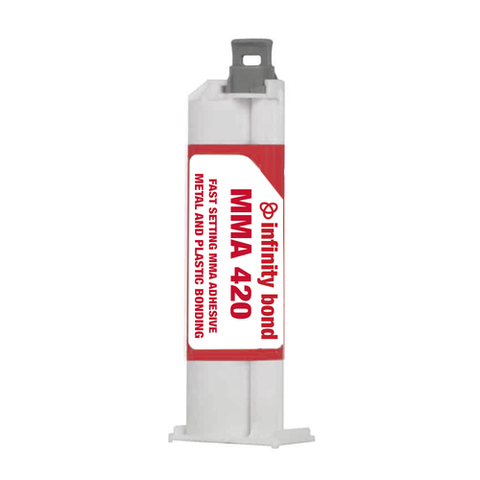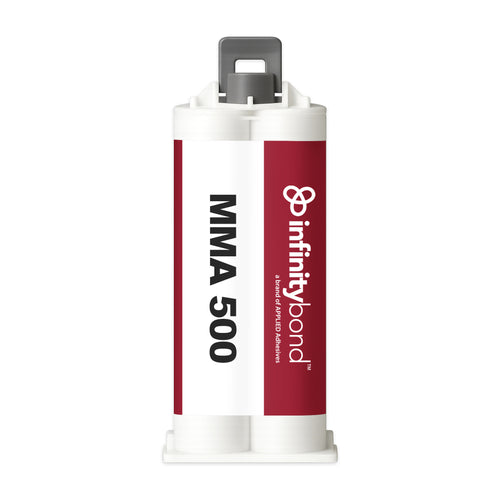There are many types of adhesives available today. In basic terms, when we talk about structural adhesives, it means an adhesive, or glue, that is used to create a load-bearing joint. Methacrylate Adhesives, or MMAs, are structural adhesives that have been developed to bond metals, plastics, and composites. They are designed with toughness, flexibility, and ease of use.
Get a Personalized Product Recommendation - Contact Us
While MMA technology is relatively new, it has already become a valuable tool for use in industries such as transportation, marine, building, and construction. At Gluegun.com we offer a variety of MMA options. In this article, we explain what MMAs are, how they can be used, and what advantages they provide. At the end, we provide a useful guide to our favorite MMA's so you can choose the right one for your needs.

Methyl methacrylate or acrylic adhesives are made of a resin and hardener. Most MMAs also contain rubber and additional strengthening agents. MMAs cure quickly at room temperature and have full bond strength soon after application. The adhesive is resistant to shear, peel, and impact stress. Looking at the bonding process more technically, these adhesives work by creating an exothermic polymerization reaction. Polymerization is the process of reacting monomer molecules together, in a chemical reaction, to form polymer chains. What this means is that the adhesives create a strong bond while still being flexible. These adhesives are able to form bonds between dissimilar materials with different flexibility, like metal and plastic. Unlike some other adhesives like two-part epoxies, MMAs do not require heat to cure. There are MMAs available with a range of working times to suit your specific needs.
MMAs are widely used for applications in aerospace, automotive, marine, composites, and transport. Because they cure quickly, they are often used in production lines. They are used for bonding metals including steel, stainless steel, and aluminum. They are used with composites including fiberglass and carbon fiber, unsaturated polyester, vinyl ester, gel-coat, sheet molding compound and epoxy. They are also commonly used with other thermoplastics like acrylics, acrylonitrile butadiene styrene (ABS), polycarbonates and polyvinyl chloride (PVC). Specific uses include:
 |
|
MMAs require less surface preparation than other adhesives. When using MMAs to bond metal and plastics for example, you only need to use a solvent or alcohol wipe to remove any oils from the surface instead of having to clean and scoff the surface with an abrasive material. Using MMAs allows you to work with many different materials and requires less preparation than other adhesives. “Pre-Mix” MMAs are also available and can be used in dispensing guns or automatic dispensing equipment, they are packaged in cartridges with mixing nozzles. These products have the added benefit of good gap fill capability and allow for easy dispensing and accurate application.
They can replace mechanical fasteners and welding joints. They also offer advantages over other adhesive technologies. Using fasteners like bolts and screws requires more time and labor, and the bolts can corrode and loosen over time. Welding two different metals together is sometimes possible, but it is expensive and labor-intensive. Epoxy adhesives do not bond different metals well because they are more brittle and do not allow for expansion and contraction, which leads to cracks and ultimately bond failure. Polyurethanes need more surface preparation and often require priming of the surface, adding an additional step. MMAs are less brittle than epoxies and can fill large gaps. They have higher bond strength than urethanes and better impact and fatigue resistance. They also offer good chemical and environmental resistance, and fast cure speed. Features of MMAs include:
 |
|
MMAs have higher peel strength and are more temperature resistant. They develop strength faster allowing parts to be used sooner. It is also worth noting the different processing conditions used for MMAs. For example, the two components of MMAs can each be applied separately to one of the materials being bonded together, and the MMA will not begin to cure until the joints are brought together, combining the components. This means that you do not have to deal with precise mixing ratios to get a good bond. It is important to remember that MMAs do tend to have a strong smell, meaning you should have good ventilation when applying them and they are flammable so some care is needed.
Toughened Impact Resistance
 |
Whether you need a 5-minute or a 10-minute open time, these toughened impact resistant MMA's offer excellent strength to a variety of substrates, even ones that are notoriously difficult. |
High Performance
 |
The high-performance collection of MMA's is perfect for a variety of product assembly and manufacturing operations. With a range of open times from 5-minute, 10-minute and 20-minute you'll be able to find the right fit |
Bonding Difficult Plastic
 |
For a permanent, chemical bond on the most difficult plastic, the Infinity Bond MMA 500 is one of the best products on the market. It's a powerful 1:1 two-part adhesive and can even bond plastics like Polyethylene (PE) and Polypropylene (PP). |
Slow Set, High Strength
 |
For large surfaces that require a slow set time, the Infinity Bond MMA 422 is a great adhesive. It has a work time of around 20 minutes and is ready to be handled after about 50 minutes. The MMA 422 is commonly used for composite bonding, automotive, marine industry, and construction applications. |
Still Have Questions?
At Gluegun.com we offer from several different manufacturers including Infinity Bond, ASI, 3M, and Loctite acrylic and MMA adhesives. We always work to make sure that we provide you with the highest quality products available. MMAs will help you complete your projects easily and provide superior performance in many key areas. Our adhesive experts are always here to answer any questions you have about products or applications. Please contact us today for more information.














